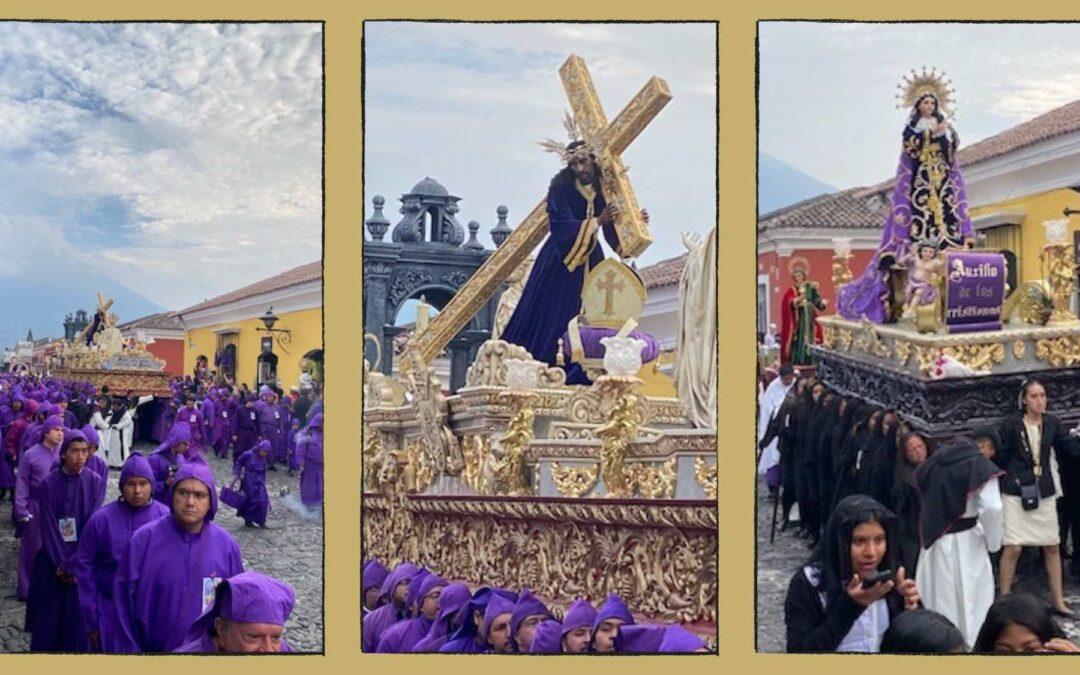Dear Friends,
During my recent trip to Guatemala (for meetings to plan the summer mission trip), we had an opportunity to be a part of Antigua’s Lenten procession. It involved hundreds of people dressed in purple, playing drums and pipes, walking ahead of several floats upon which were displayed life-sized scenes of the events surrounding Jesus’ crucifixion. The amazing thing was that the floats were not being pulled by a pickup but were carried on the shoulders of about forty people walking in a practiced processional step, four steps forward and one step back. Men carried the images of Jesus and women carried the images of Mary. Each Sunday during Lent they would have a procession and then during Holy Week they carry even more floats, with more people involved. The average length of the procession was over 24 miles. They would walk for more than 15 hours a day. The locals told us that the people in the procession prepared for Lent and Holy Week all year long. They would improve the floats and toughen their bodies – all to give praise to God for the great gift of salvation.
What we do here at Cabrini is tiny by comparison. Even the outside stations of the cross done in South Omaha on Good Friday are small when compared with these grand processions in Guatemala. However, even if our way of remembering Jesus’ final moments is not grand, it is still important for us to do.
On Good Friday during the reading of the passion and veneration of the cross we encounter Jesus not as God or the leader of a religion but as a simple and fragile man. Nowhere in the accounts of his life is he more human. On this day, there are no miracles. No sermons. No parables. There’s no walking on water, no turning water into wine. No one is healed and no demons are cast out. On Good Friday, we find Jesus raw and broken. He is, like all of us, vulnerable and subject to great pain.
Regardless of the humiliation and the physical abuse that Jesus endures, he never behaves in typical human ways. When Roman soldiers beat him, he doesn’t curse them. Jesus doesn’t fight back, doesn’t charge his followers to riot on his behalf. After his friends abandon him, he doesn’t cast judgment. Instead, he accepts them for who they are. In the midst of great loneliness, Jesus prays. Standing before his accusers, he remains calm. Bleeding from the brutal assault to his body, Jesus forgives his attackers. As he hangs from a cross, he doesn’t think about himself. Instead, he turns his focus to his mother and the other women who remained faithful. In his compassion during his death, Jesus not only offers us the ultimate example of grace under pressure, but he shows us what it means to be truly human, what it means to possess divinity in human form. And, from the cross, he offers us the hope of eternal life.
We will not be asking you to carry a float with 39 of your friends for 24 miles and 15 hours this week. We will ask for one simple gesture during the Good Friday liturgy. We will invite you to come forward and venerate the wood of the cross. In doing so, you will be able with a simple kiss or touch to express your love for Jesus who gave his life to free you from death.
Take some time this week to join fellow Cabrini parishioners in prayer. The week the Church calls Holy is upon us. Your Easter will be more joyful if you have walked this week with Jesus.
Peace,
Fr. Damian



